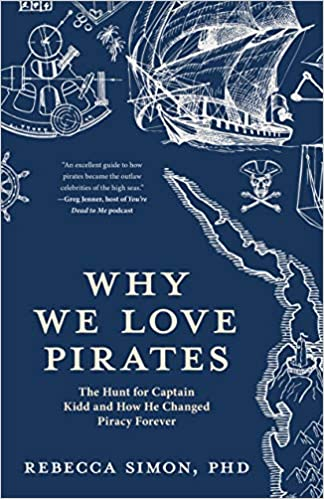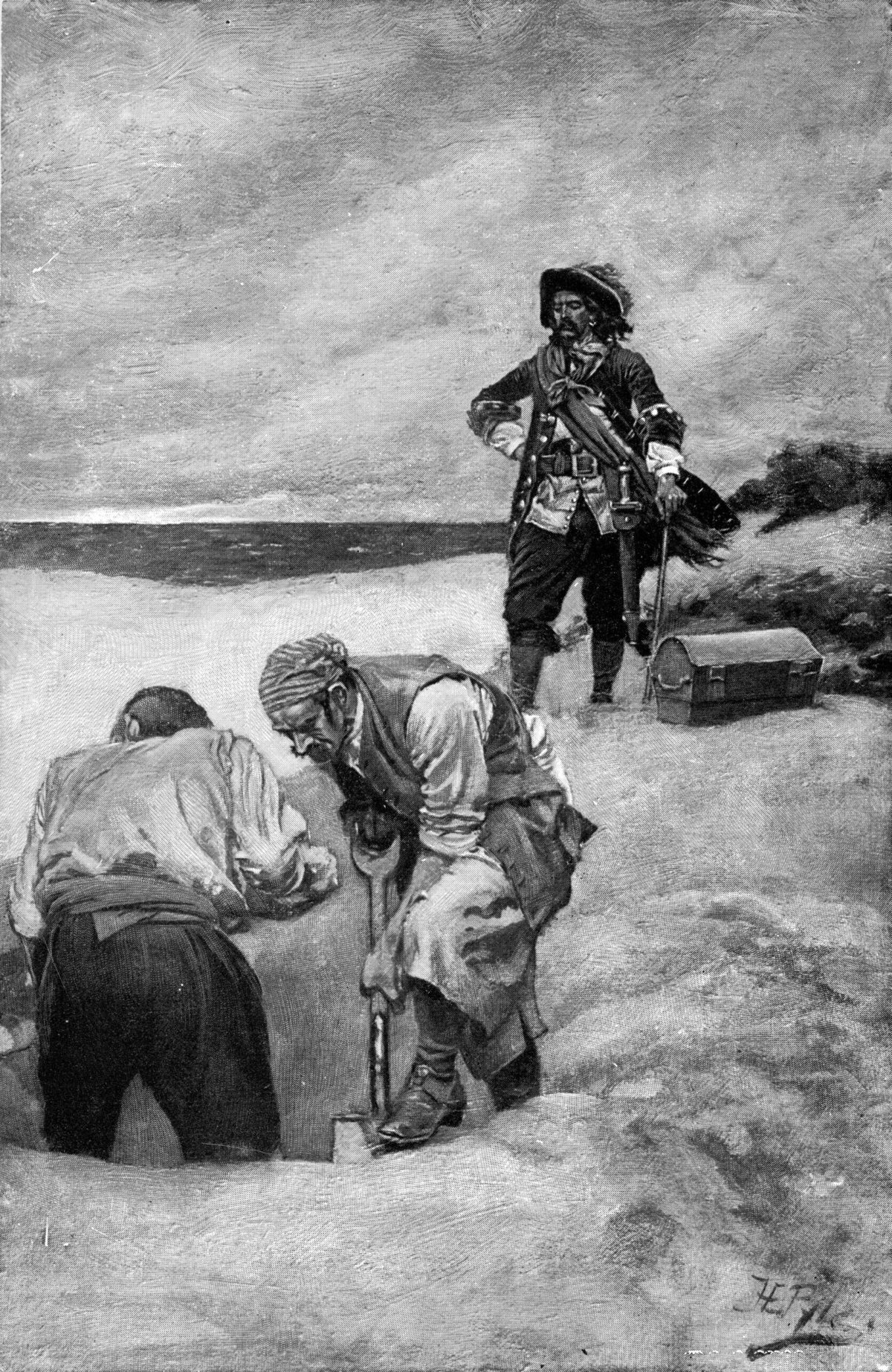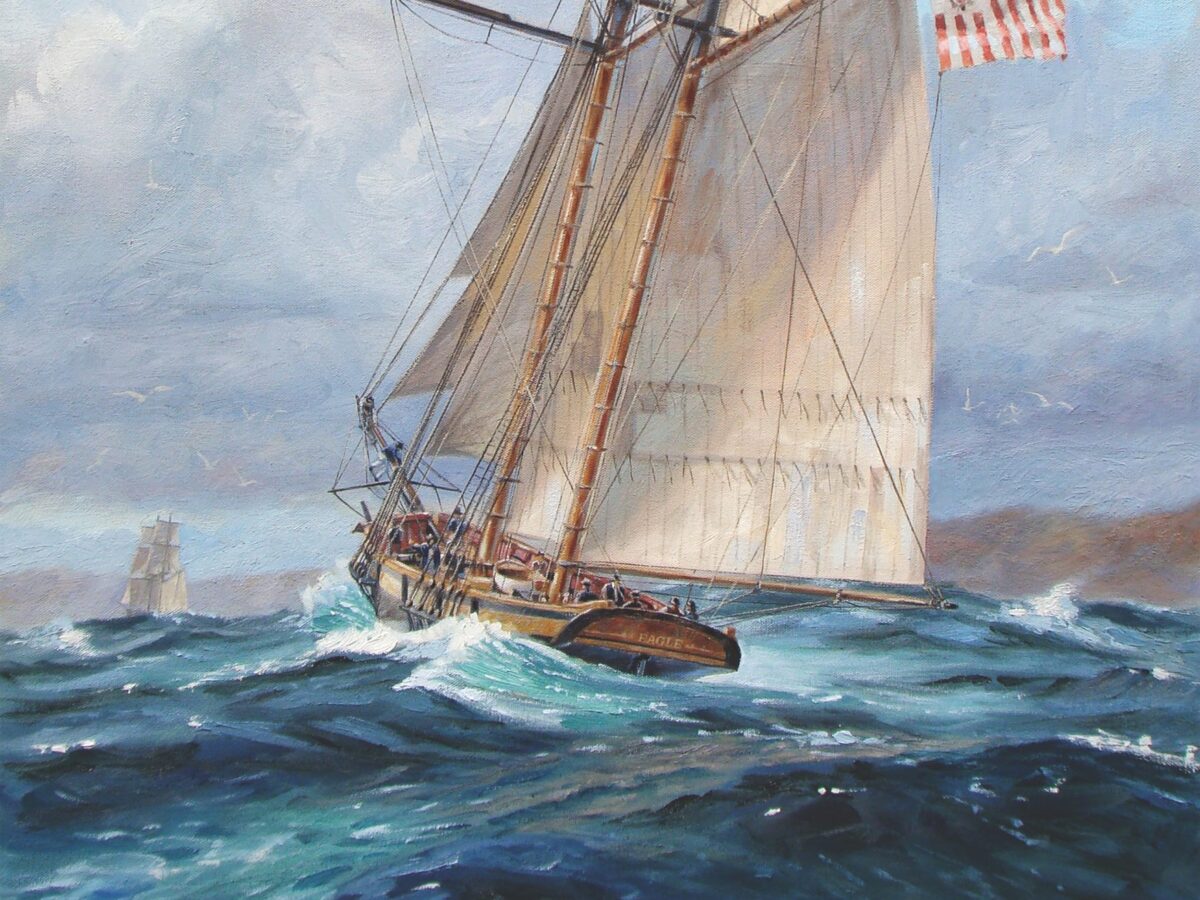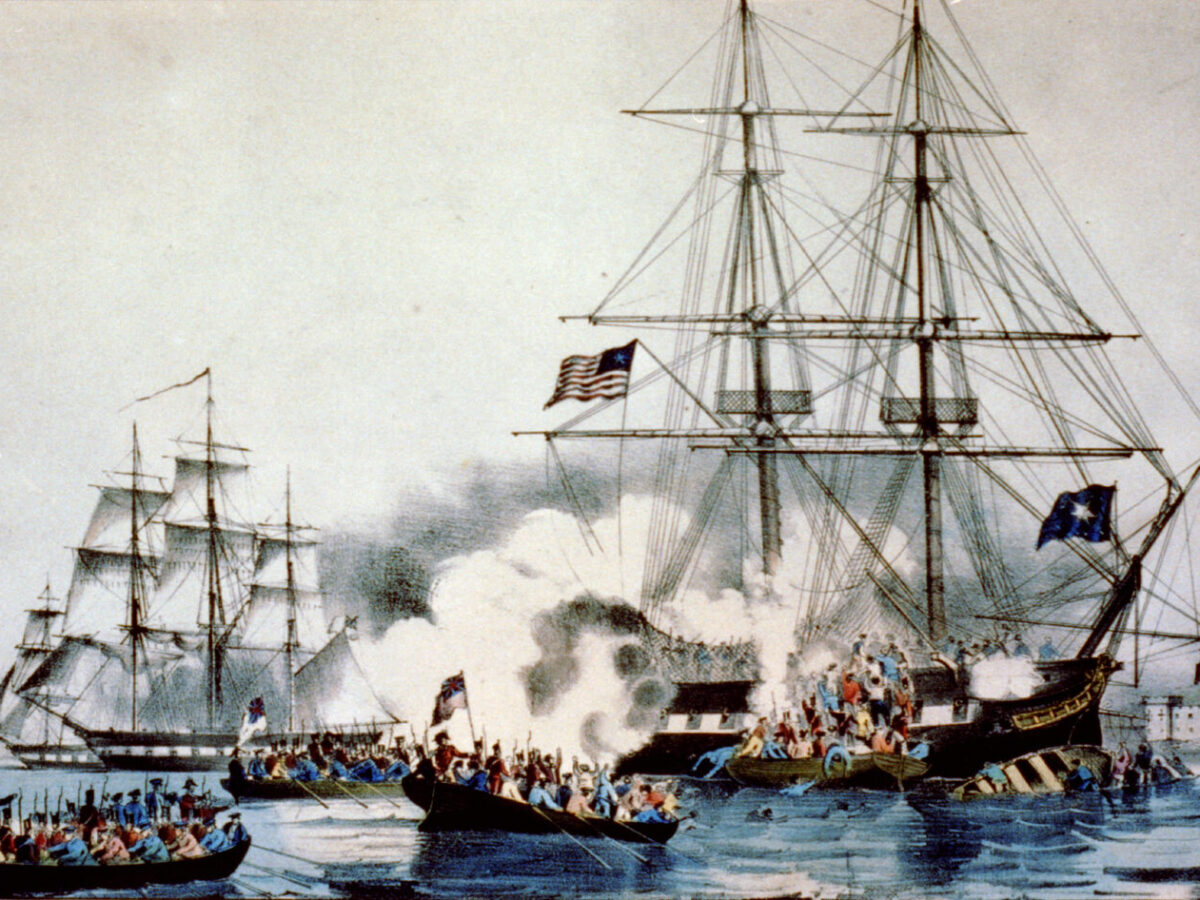From swashbuckling Captain Jack Sparrow in “Pirates of the Caribbean” to the “seemingly always missing an article of clothing over his taunt, tanned abs” Charles Vane in “Black Sails,” it is safe to say that popular culture has romanticized our view of pirates.
More often than not, these rogues of the sea are depicted as impossibly good looking, eccentric, brilliant, gritty and almost always fighting against The Man, piracy is often a place where lore, history and Hollywood meet.
HistoryNet recently spoke with Dr. Rebecca Simon on her latest, “Why We Love Pirates: The Hunt for Captain Kidd and How He Changed Piracy Forever” and how the history behind these men and women might actually be much cooler than we already believe.

Why We Love Pirates: The Hunt for Captain Kidd and How He Changed Piracy Forever
by Dr. Rebecca Simon, Mango, November 17, 2020
If you buy something through our site, we might earn a commission.
Before we dive into your latest book, “Why We Love Pirates,” I have to ask because I find it so fascinating — what drew you to getting a PhD in piracy?
Well, I would say it was probably really started in grad school. I really enjoyed the “Pirates of the Caribbean” movies, I thought they were a lot of fun — at least the first one — but I never thought about pirates otherwise. Then, when I was in grad school doing history, I was taking a course on Atlantic history, because I love both British and American history, and colonization. Atlantic history was kind of like the perfect subject to really get into. We read a book called “Villains of All Nations” by Marcus Rediker. It was kind of about how pirates had these egalitarian societies on the ships and how the British used acts of terror to go against pirate because they thought pirates were terrorists. Before that I never realized you could actually research pirates, and I kept wondering how we went from that to the likes of Jack Sparrow? Yeah, that change happened but how did that change happen? I wanted to explore how perceptions of piracy changed, and the romanticization of history and pirates was the perfect lens for it.
Recommended for you
As someone who loved “Black Sails” and the like, and of course, Pirates of the Caribbean, there’s definitely this romanticized view of pirates. Is the story of Captain William Kidd the origin of this or did it predate him?
So pirates have always been sources of fascination, but I argue that I think Captain Kidd was the game changer in the sense of starting to really romanticize pirates. This is because his career was just highlighted so much, and people were following along with what was going on with him live as it was happening.
To put it really simply, he was the privateer who basically robbed the wrong ship in the East Indies. He also got in a fight and killed a crew member on board and so legally, if you rob a ship and kill someone on a body of water, you are a pirate. But it’s only when he arrives in Madagascar that he realizes he’s wanted for piracy. Part of the reason is that a few years before him, a British pirate robbed several Indian Mughal ships and the British weren’t able to catch him. And so the Indian Mughals, who were really powerful Indian merchants, said “if you don’t catch this guy, we’re cutting off all trade. And it’s basically going to be an act of war.” They were even holding Englishmen hostage on the Indian subcontinent during this time. So the British started this huge manhunt going after Kidd to kind of set an example so they wouldn’t lose any of their new trade links going in. It became a sort of live documented manhunt. People were reading about it in the newspapers.
Kidd finds out and he writes to a friend of his [Lord Bellomont] who was governor of New York and Massachusetts, but the latter doesn’t want to be associated with him anymore. So [Bellomont] lures Kidd to Boston promising protection and has Kidd arrested once he’s on shore. Now, the big thing about Kidd that kind of really solidifies him into a romantic idea is that he writes to his friend, Lord Bellomont, telling him that he’s taken hundreds of thousands of pounds of gold and jewels, et cetera, et cetera, and buried all of it on Gardiners Island, just off the coast of New York. Bellomont goes and looks for it. Nothing is there. Absolutely nothing. They even arrest Kidd’s wife and servants in order to question them.
All the goods he had stolen had been offloaded in the Caribbean before he got to North America. Yet this sparks rumors of buried treasure that have been going on to this day, basically. In fact, when I say pirates didn’t actually bury treasure a lot of people say, “Oh, but Captain Kidd did!” and I’m like, no! It’s easy to think that, but actually no.
It was around the early 18th century when you started to have other really, really famous pirates in the newspapers. Most people were far removed from pirates so it seemed kind of exotic in a way. But I think it was Kidd, because newspaper documentation was so good by the time he was a pirate, that he was the one who ushered in this new era of romanticizing piracy.
GET HISTORY’S GREATEST TALES—RIGHT IN YOUR INBOX
Subscribe to our HistoryNet Now! newsletter for the best of the past, delivered every Wednesday.
Do you believe Kidd was a pirate in the true sense? Or was he simply acting as a “privateer.”
This isn’t a good answer, but I feel like it’s kind of all the above in a way. Kidd always really straddled the line between privateer and pirate — he was always kind of pushing the envelope. He was always really irritating the British authorities to the point where he was court martialed, almost court martialed a few times even. But all we really have to go on is from Kidd’s trial. In his trial, he keeps saying over and over that he robbed the wrong merchant out of pressure from his crew who were threatening to mutiny (because they did not really have good luck as privateers).
It was really kind of an unlucky mission from the start. They had a cholera outbreak on the ship, a lot of people deserted in Madagascar, they aren’t really making much money. And so they pressure him to go after this big ship and Kidd is like, “I don’t think this actually fits with our letter of marque.” But eventually he does, thinking it’s a Dutch ship, an enemy of Britain, or at least a competitor of Britain. Turns out, it’s an Armenian ship being sailed in the East Indies that was actually being captained by an Englishman. And so, in a way, he’s actually attacked his countrymen. In his trial, Kidd maintains his innocence the entire time and that’s all we have to go on. So technically, legally, he is definitely a pirate, but whether or not he actually intended to be is kind of a whole other story.
What’s interesting is that in his trial, he’s actually not found guilty for piracy. He’s found guilty for murder, because they couldn’t quite get enough evidence to say that he was officially a pirate, but he did kill one of his crewmates, William Moore, in a fight. So that is actually what he ends up being convicted of.
How did the U.S. colonies at the time help provide protection to these men and women?
American colonists actually had quite a complicated relationship when it came to piracy. In New England, they hated pirates because it was very much a maritime-based community in general — they were very dependent on the logging trade and the fishing industry. Pirates coming in and disrupting that was very detrimental to all the communities.
When you start going further south into the mid-Atlantic and the Southern colonies, yes they do depend on trade, but they themselves don’t have such a tight maritime economy the way New England did. You’ll find that a lot of those regions actually did start working with pirates and that there were a lot of islands in the Caribbean that did as well.
This is because in 1651 the British passed something called the Navigation Acts, which banned all British colonists from trading with anyone outside of Britain or other British colonies. The point was to weaken Spain and France because they were their major European competitors in the region. And so a lot of people began turning to pirates who would rob indiscriminately and bring in these goods. You had a lot of governors who would turn a blind eye or outright accept goods from pirates.
What’s interesting is that piracy changed colonial America and Britain’s relationship. Colonial America was pretty autonomous for the most part up until the turn of the 18th century. They had their own legal courts, their own legal system, their own laws — they were allowed to run themselves with very little interference. But then around 1700, when Britain officially declared the war on pirates, Britain said that all pirates must be tried by the laws of England. A lot of lawmakers were actually quite upset about this because now they no longer had control over their own courts — they lost a lot of their own legal autonomy. A lot of them were saying that the way it was done in England, just wasn’t possible in the backwoods of Virginia or on the Virginia coastline.
The British were also trying to raise money from lost revenue. They were taxing things like sugar, much earlier than the Intolerable Acts in the 1770s. Merchants complained about it, saying the British would either get the Americans really angry or have them turned to pirates. Both were true. So there was actually a lot of colonial discontent between the Americans and the British, though it wasn’t because Britain was cracking down on piracy. It was because Britain was making the colonies change the way they ran their legal courts.
As you were researching this book were there any ancillary characters — or overlooked characters — and their stories that piqued your interest?
I think what’s interesting about piracy is that there’s just so many pirates out there that we just can’t really know about because of the lack of information and the resources. So anytime I will come across a random pirate in a newspaper article or in a trial transcript, I always would love to know more about them just because those are the voices that got lost.
What I find interesting is that around 1701 piracy sort of goes on pause because of the war of Spanish Succession. A lot of pirates are hired as privateers to fight in the war, and then after it ends a lot of them go back into piracy. This is where you start getting really famous ones: Benjamin Horner Gould, Edward Teach and Charles Vane, etc, etc. Thomas Tew, I think is really interesting. He operated in the East Indies in the 1690s, kind of right before Henry Avery. I find him really interesting because he did one expedition to the East Indies as a privateer, committed piracy but was welcomed.
Tom was a hero because he brought in so many goods. He was getting ready for his next voyage but then died before he could complete it. I think Tom is one that kind of gets lost in the shadow of Henry Avery and Kidd, unfortunately, but he is interesting because he’s really celebrated for his acts of piracy.
And from ancillary to main, can you speak about some of the more famous female pirates in history?
Well, we’ll never know how many female pirates there were because women generally weren’t allowed to be on pirate ships. If they did, they would have disguised themselves as men. But we do know of Anne Bonny and Mary Read, who sailed as pirates between August and October of 1720. They’re probably the two most well known pirates of the age. Bonny was married to the pirate Captain Jack Rackham.
And we don’t actually know how Anne Bonny joined up on their ship, but she met up with them sometime when they were in Nassau, which was kind of the pirate stronghold in the 1710s in the Bahamas. The governor of the Bahamas had actually issued a warrant for their arrest, listing Anne Bonny and Mary Read. So people knew who she was before they got onto the ship. But they were really famous despite only sailing for two months. They were some of the fiercest fighters. They were ruthless, merciless. But unfortunately, their careers only lasted for two months because they were around a lot of heavy shipping lanes, and there were some pirate hunters who had been hired to go after them. They all got caught and the two of them were put on trial and found guilty of piracy. They were both sentenced to be executed for it, but they both got a stay of execution because it turned out they were both pregnant.
Mary Read would eventually die in prison from jail fever, which is what we call typhus. But with Bonny, we actually don’t really know what happened to her, her death is kind of a mystery to this day. They probably didn’t execute her, 95 percent of women who were sentenced to be executed didn’t actually get executed. But in terms of other female pirates, the vast majority of the ones we know were usually women who were members of really powerful families. That’s kind of the pattern.
Bonny and Mary Read, though, are quite interesting, because they didn’t have such powerful origins.
I always like to end interviews on a lighter note, so if you had to be out on the high seas with one pirate as your captain, who would you choose?
Ooh, really good question. I think I would choose Benjamin Hornet Gold, because he was a really brilliant privateer, and he was a good leader. He also knew when to make reckless decisions and when to not make reckless decisions. He was also the person who trained up some of the most notorious pirates such as Blackbeard, so that means he had to be a really good one himself. He managed to avoid being arrested, although he did become a pirate hunter, but he was never actually killed for being a pirate. So I feel like it’d be a little bit safe on his ship. Safe as a crewman.
historynet magazines
Our 9 best-selling history titles feature in-depth storytelling and iconic imagery to engage and inform on the people, the wars, and the events that shaped America and the world.








